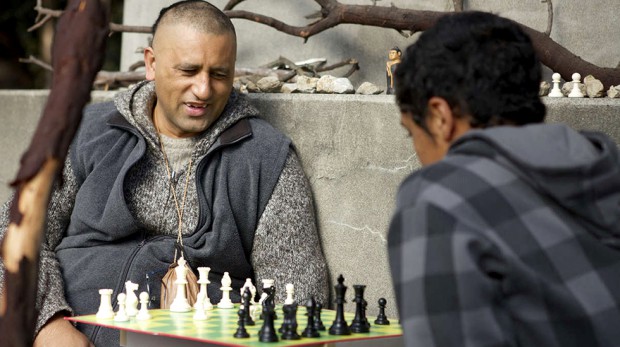 For his second feature film, young New Zealand director James Napier Robertson chose to tell the story of troubled Maori chess prodigy, Genesis Potini, whose battles with bipolar disorder did not keep from inspiring a group of disenfranchised children through his chosen art. TRAVIS JOHNSON checks in.
For his second feature film, young New Zealand director James Napier Robertson chose to tell the story of troubled Maori chess prodigy, Genesis Potini, whose battles with bipolar disorder did not keep from inspiring a group of disenfranchised children through his chosen art. TRAVIS JOHNSON checks in.
James Napier Robertson started out as a child actor but, disappointingly, imdb seems to be mistaken about his most notable role – he was never, he tells us, in Mad Max Beyond Thunderdome.
“I think that’s a bit of a muck up on their part actually,” he laughs. “I think there are a few things out on the internet about me that I’m not sure where they’ve come from, so put that one in that category.”
He did, however act in a number of roles before stepping behind the camera. “I started acting quite young and I was acting while I was at school and I failed school and came out of it straight into Shakespeare and theatre and loving that. I reached a point where I realised I had to pay my rent and got into screen acting and just never really enjoyed it the same way. All along I had been writing and realising that I more wanted to be on the side of making stuff. As an actor, often you just learn the lines that someone else wrote, show up, say them the way someone else wants you to, then you don’t see the result for months. At that point it’s all so removed.
“I wanted to get into actually doing stuff. So I started making some short films and one thing led to another. The first feature I made [2009’s I’m Not Harry Jensen] I was 22- 23, and the producer was an actor I’d done a TV show with when we were a lot younger, so we sort of just kicked it off then.”
It was producer Tom Hern who stumbled across the true story of Genesis Potini. “He saw a documentary that had been made about this guy. It wasn’t very well known, he just saw it on TV one day and thought, what an amazing story, and particularly what an amazing character, Genesis. I was in LA at the time with the film that we’d just finished making, getting it seen, and he called me and said, ‘I found our next film. you’ve gotta see this.’ About 20 minutes into it I was booking my flight back to New Zealand, because I was completely won over by Genesis.
“We met up with Genesis and kind of got to know him and that’s what kind of kicked it off. I ended up playing chess with him, because I’d played chess for quite a long time, and he basically started kicking my ass at chess and I started writing the script. It kind of all went on from there.”
It was a long process, though. “It was about three years of pretty solid writing, working on it. There was the odd other script that I was working on in that period, but it was primarily this. It was interesting – I hadn’t made a film before that involved working with real people and a real story, and people that were alive and would see this film and would hate you if you didn’t tell this story right or if you made their character something other than what they actually are, but you’ve still got to tell the story in a strict narrative medium that can’t really be longer than two hours. So it was really quite challenging capturing it all. There are so many worlds in this film – there’s the mental health world, the gang world, the chess world, and it’s trying to bring all those worlds together in a way that’s cohesive. That was quite tricky.”
One thing Robertson couldn’t predict is that the resulting script would attract the attention of Cliff Curtis, who first came to prominence in Once Were Warriors before becoming a familiar face in a number of domestic and American productions.
“Cliff got given the script by another actor without us knowing,” Robertson recalls. “And out of the blue called Tom from LA and said he wanted to talk about it. That kicked off a series of conversations. It was quite a scary role for him, quite risky, and he wasn’t sure which way we wanted to take it, what we wanted to do with it. And for us, he was this svelte, good looking leading man, this Hollywood-looking good, and Gen was this overweight, toothless guy – how do we get from there to there. I needed Cliff to do two things – one was to put the actual weight on, and two was to method act the role. He wasn’t too keen on doing either of those things, but once he got his head around it, that was a massive way in for him to actually get into his character. But his wife couldn’t stand me for ages after that!”